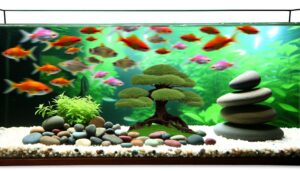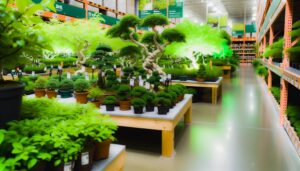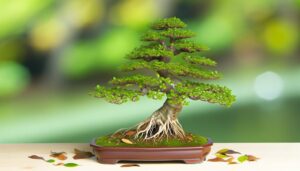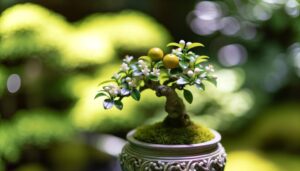How Coffee Grounds Are Good for Bonsai Trees
Coffee grounds offer essential nutrients like nitrogen, phosphorus, and potassium, which support vegetative growth, root development, and disease resistance in bonsai trees. However, excessive use can acidify the soil, impair aeration, and disrupt nutrient balance.
High nitrogen levels and allelopathic compounds such as caffeine may inhibit root growth. To maximize benefits, fully decompose coffee grounds, mix with compost in a 1:4 ratio, and apply sparingly to avoid root contact.
Monitoring soil health is critical to prevent over-fertilization. For more about the careful integration of coffee grounds in bonsai care, further insights await.
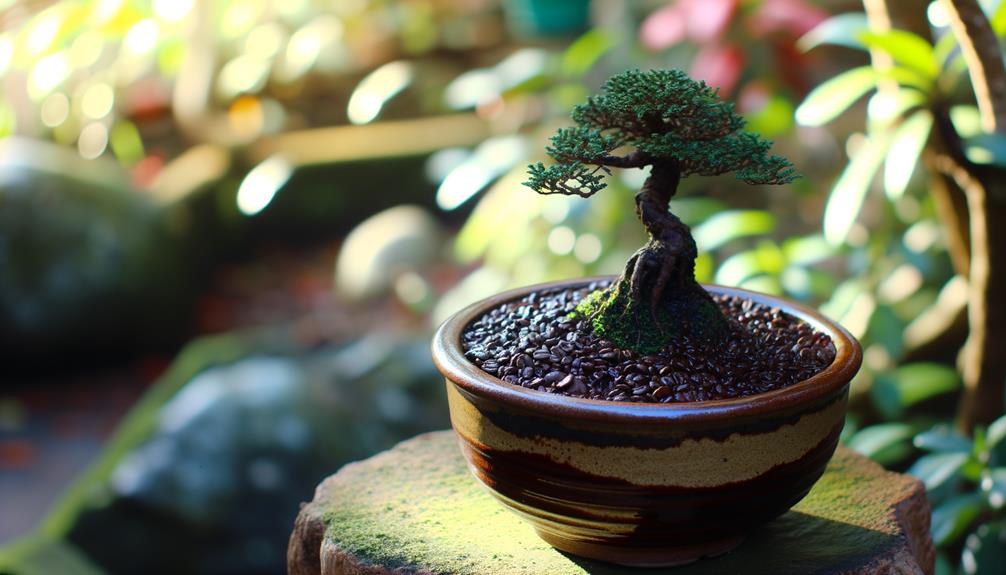
Key Takeaways
- Coffee grounds provide essential nutrients like nitrogen, phosphorus, and potassium beneficial for bonsai trees.
- Excessive use of coffee grounds can cause soil acidification, harming bonsai nutrient uptake.
- Properly decomposed coffee grounds mixed with compost improve soil structure and microbial activity.
- High nitrogen content in coffee grounds may lead to over-fertilization and nutrient imbalances in bonsai trees.
- Coffee grounds should be applied sparingly and monitored for signs of over-fertilization to avoid bonsai health issues.
Nutrient Benefits of Coffee Grounds
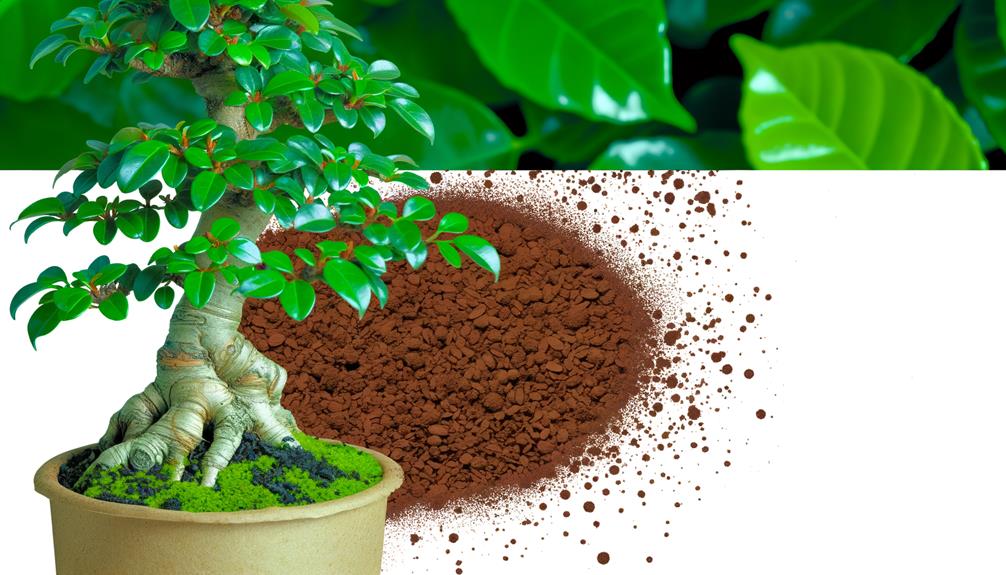
Coffee grounds are rich in essential nutrients like nitrogen, phosphorus, and potassium, which can greatly enhance the soil quality for bonsai trees. Nitrogen is vital for vegetative growth, aiding in the development of lush foliage. Phosphorus supports root development and flowering processes, while potassium is essential for overall plant health, enhancing disease resistance and water uptake.
Research indicates that the slow-release nature of these nutrients from coffee grounds guarantees a sustained supply, promoting steady growth. Additionally, the organic matter in coffee grounds improves soil structure, increases water retention, and fosters beneficial microbial activity. Utilizing coffee grounds as a soil amendment can thus establish an ideal growing environment for bonsai, aligning with horticultural best practices.
Potential Risks to Bonsai Trees
While the nutrient benefits of coffee grounds are well-documented, it is also important to take into consideration the potential risks they pose to bonsai trees. Excessive application can lead to soil acidification, adversely affecting nutrient uptake.
Coffee grounds may also compact soil structure, impairing aeration and root respiration. Additionally, the high nitrogen content can disrupt the delicate nutrient balance required by bonsai trees, potentially leading to over-fertilization.
Moreover, the microbial activity stimulated by coffee grounds can deplete oxygen levels in the soil, exacerbating root stress. Finally, the presence of caffeine and other allelopathic compounds may inhibit root growth and overall tree health. Understanding these risks is essential for maintaining the best health of bonsai trees.
How to Use Coffee Grounds
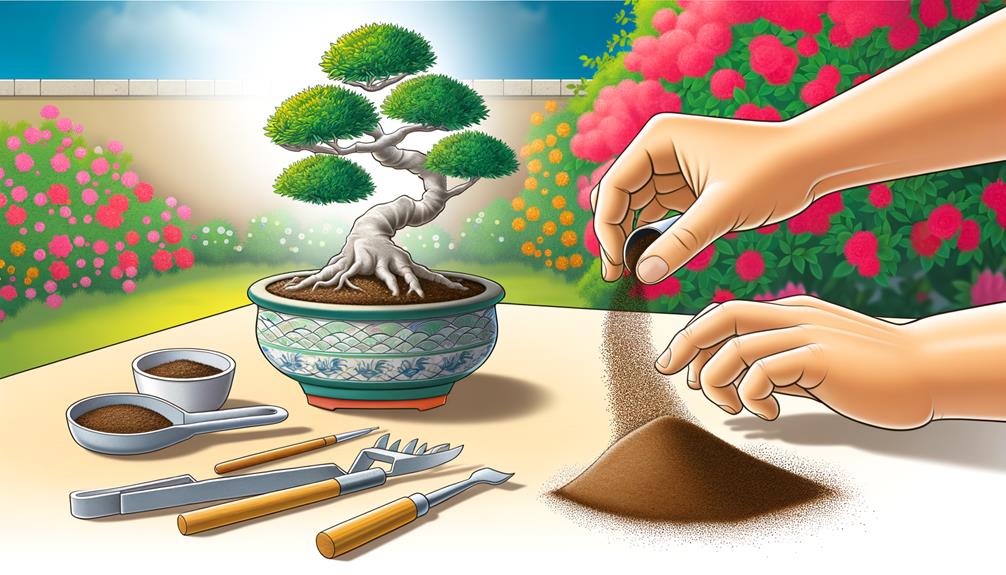
To effectively utilize coffee grounds for bonsai trees, it is essential to incorporate them in moderation and with a strategic approach to avoid potential adverse effects. Begin by ensuring the coffee grounds are fully decomposed to prevent nitrogen immobilization.
Mix the coffee grounds with organic compost in a ratio of 1:4 to dilute their high acidity and nutrient concentration. Apply this mixture sparingly around the base of the bonsai, ensuring it does not directly contact the roots. This method enhances soil structure, promotes microbial activity, and adds essential nutrients.
Regularly monitor the bonsai for any signs of over-fertilization, such as leaf burn or stunted growth, adjusting the frequency and quantity of application accordingly.
Expert Opinions and Research
Numerous studies and horticulture experts highlight the benefits and potential risks of using coffee grounds as an organic amendment for bonsai trees. They emphasize the significance of balanced application and soil health monitoring. Research indicates that coffee grounds can enhance soil structure, improve water retention, and provide essential nutrients such as nitrogen. However, over-application may lead to soil acidity and nutrient imbalances detrimental to bonsai health.
Nutrient Content: Coffee grounds are rich in nitrogen, which is pivotal for foliage growth but must be balanced with other nutrients.
Soil pH: Excessive use can acidify soil; monitoring pH levels is crucial.
Microbial Activity: Coffee grounds can stimulate microbial activity, beneficial for soil health.
Drainage: Properly integrated, they can enhance soil aeration and drainage.
Alternatives to Coffee Grounds
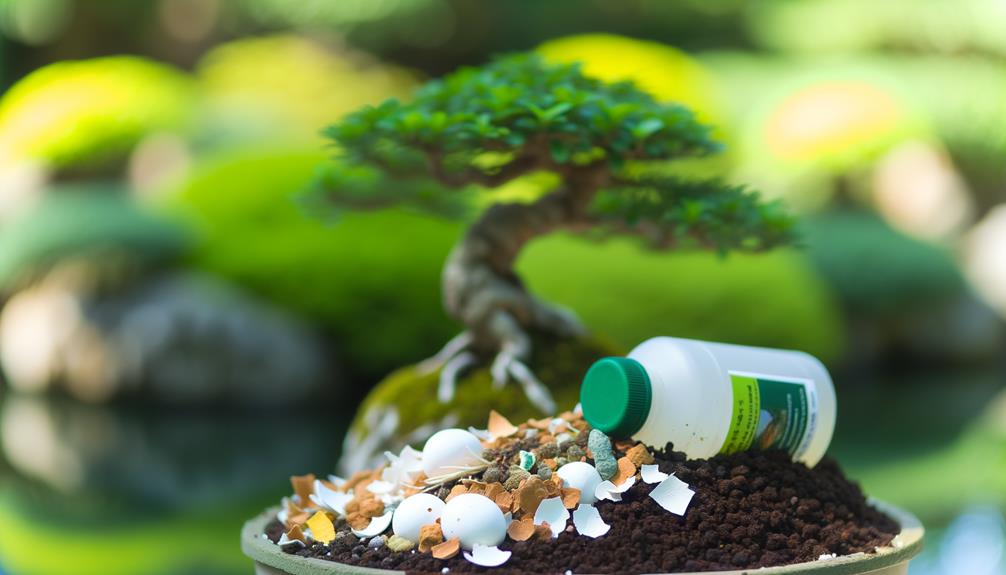
For bonsai enthusiasts seeking organic amendments beyond coffee grounds, several viable alternatives exist that can provide balanced nutrients and promote healthy soil conditions. These alternatives include well-composted organic matter, bone meal, fish emulsion, worm castings, and kelp meal. Each offers distinct benefits and nutrient profiles suitable for bonsai care.
| Organic Amendment | Nutrient Profile | Benefits |
|---|---|---|
| Compost | N-P-K varies | Enhances soil structure and microbial activity |
| Bone Meal | High in Phosphorus | Promotes root development |
| Fish Emulsion | Balanced N-P-K | Rapid nutrient uptake, stimulates growth |
| Worm Castings | Rich in Micronutrients | Improves soil aeration and water retention |
| Kelp Meal | High in Potassium | Boosts stress resistance and overall plant health |
Selecting the right amendment depends on specific bonsai needs and soil conditions.
Conclusion
The application of coffee grounds to bonsai trees is akin to a double-edged sword; while they offer nutrient benefits such as nitrogen, potassium, and phosphorous, they also pose potential risks, including soil acidity and mold growth. Proper usage involves moderation and thorough research to mitigate these risks.
Expert opinions and research remain divided, suggesting that alternatives like specialized bonsai fertilizers may provide a more balanced solution for best tree health.

